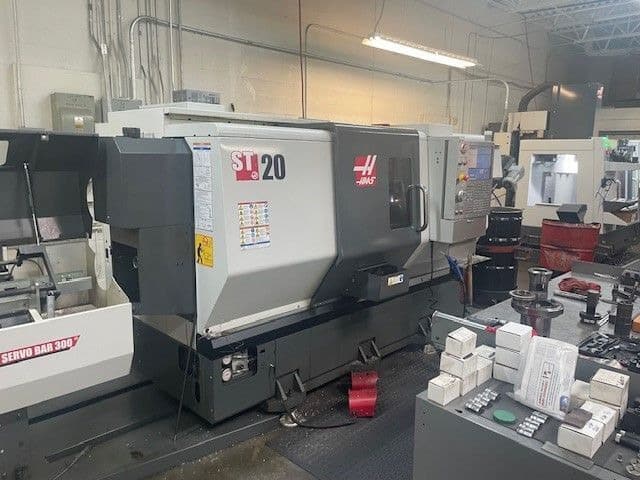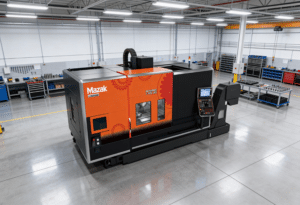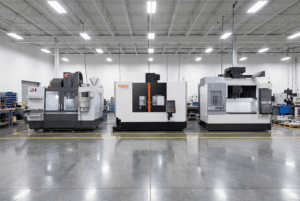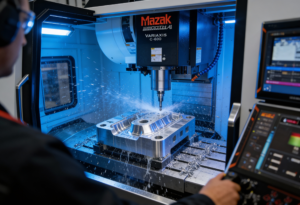The process of buying a used CNC lathe poses major challenges for beginners taking their first steps in the machinist world. The market contains multiple brands including Mazak, Haas and Okuma with a wide selection of different models. It is essential to learn the features that matter most. The following guide provides a used CNC lathe purchasing framework specifically for machine shop owners along with their managers and executives.
Figuring Out What You Need
Before acquiring the ideal used CNC lathe you must determine what specific needs and requirements you require. The first step to pick a used CNC lathe requires understanding which machine model best matches your operational requirements. The performance of your operation depends on the machine you select because all machines serve unique industry functions. Businesses in the automotive sector should prioritize acquiring flat bed CNC lathes to produce extended components including drive shafts. The aerospace industry would most likely need a slant bed CNC lathe because complex precision work demands this machine.
Review your material choice and part quantity and dimensions and accuracy requirements while designing your needs. Your analysis will lead you to the right machine selection which meets your production requirements.
| Brand | Popular Models | Primary Industries/Applications |
|---|---|---|
| Haas Automation | ST-10, ST-20, ST-30, DS-30Y | Aerospace, automotive, general machining, medical devices, oil & gas |
| DMG MORI | NLX 2500, CTX beta 800, CLX 450 | Automotive, aerospace, energy sector, precision engineering |
| Mazak | QUICK TURN series, INTEGREX series, MULTIPLEX series | Medical, aerospace, defense, automotive, energy |
| Doosan | PUMA GT, LYNX series, PUMA TT | General manufacturing, automotive parts, job shops, educational institutions |
| Okuma | GENOS L series, LB series, LU series | Aerospace, automotive, energy, medical devices |
| Hardinge | Elite series, TALENT series, GS series | Medical devices, aerospace, defense, watchmaking |
| INDEX-Werke | G200, R200, B400 | Precision components, medical technology, aerospace |
| EMCO | Maxxturn series, Hyperturn series | Educational institutions, job shops, precision manufacturing |
| Nakamura-Tome | WY-150, AS-200, SC-300 | Automotive, aerospace, medical devices |
| Citizen | Cincom L series, Miyano series | Medical devices, electronics, watchmaking, precision components |
Checking Out the Machine
You must inspect the machine condition thoroughly during the purchase process. Examine the machine for signs of damage such as rust as well as parts wear while monitoring its operational stability through normal usage. Get access to maintenance history records to check if any maintenance procedures were performed on the machine. Maintenance records alongside presentations of the machine’s condition help deliver insight into its operational history and remaining lifetime.
The measurement precision of the machine requires your inspection. Test the machine with demonstration pieces to verify their compliance with your specifications. Look out for any inconsistencies. The inability of an already used CNC lathe to deliver exact precision levels will create major problems which ultimately reduce your manufacturing speed.
Checking Machine Age and Use
Predicting the lifespan of a machine requires understanding its age together with the amount of its utilization. To estimate lifetime expectancies inquire about the operating duration of the CNC machine. Fewer hours usually mean less wear. Medical history records regarding maintenance must still be taken into account when making your decision. A machine with proper maintenance can become more valuable than a machine that received little use but no maintenance activities.
Software and Tools: What to Think About
Software controls most operations of CNC machines while also serving as their programming foundation. Confirm that the used machine operates on the present software or integrates smoothly with existing workflows. The usage of non-compatible software will create organizational challenges along with reduced production speed.
Verify the inclusion of tools and accessories when examining the machine’s equipment. The presence of the right materials reduces both time consumption and financial costs. The assessment of tool condition should be followed by an investigation of spare parts availability.
What is a realistic budget for a used CNC lathe, and what additional costs should I plan for?
purchasers should allocate between $20,000 and $100,000 to secure a used CNC lathe with the price depending on the machine’s dimensions, brand, model and age. The initial purchase price marks only the start of the expenses. The transport expenses you should anticipate range from $2,000 to $10,000 based on both machine dimensions and delivery distance. The required power supply consists of stable 480V three-phase for bigger machines, yet smaller versions require 240V. As preparation for your facility ensure electrical upgrades to go alongside foundation work and coolant system installation. During planning allocate funds for tooling packages as well as operator training and machine maintenance. The cost of secondary expenses should amount to about twenty percent of your equipment investment.
How long does it typically take to get a used CNC lathe up and running in production, and what are common startup challenges?
The process of operating a used CNC lathe runs from delivery time until it reaches full functionality within 2-6 weeks. The primary obstacles you will encounter during startup phases never revolve around mechanical issues but organizational matters. Operator training usually takes time even if the personnel have experience with CNC lathes because each machine requires its own unique adjustment period. A machine conversion takes longer than predicted since it involves adapting previously manufactured components to operate with the new system. The main startup challenges stem from problems in coolant system setup tool holder mismatch and unoptimized post-processing software. Your team must develop familiarity with machine features throughout the initial month thus leading to productivity reductions.
What certifications or documentation should I require when buying a used CNC lathe for regulated industries like medical or aerospace?
You need various essential documents in addition to maintenance records when working in regulated industries. Obtain the accuracy certification issued by the product’s original manufacturer together with all calibration proof documents. The proof of geometric accuracy testing must have thorough documentation especially for significant dimensions including spindle runout and axis alignment. The documentation of existing work output that achieved equal precision levels as your project requirements will be critical for medical or aerospace involvement. Additionally important are documentation related to retrofits as well as major repairs control system updates and complete crash history. Machine documentation serves two functions: helping meet regulatory requirements while allowing users to comprehend operational limits.
How can I verify the machine’s networking capabilities and ensure it will integrate with modern CAM software?
Modern manufacturing depends on the integration of CAM systems as well as network monitoring for its operations. The first step involves examining both DNC programming and Ethernet capabilities in the control system. Companies with existing control systems that are antiquated might require an upgrade of their communications systems. Your CAM software may require custom post-processor development which can become an expensive undertaking despite the available list of standard post-processors you should check. Purchase decisions for file transfer methods should include tests of USB as well as network and RS-232 when necessary. Ensure the control has the capability to run both modern programming features such as canned cycles and subprograms which your CAM system generates. The software tool monitoring and production tracking must be compatible with your plan.
What are the environmental and power requirements I need to consider before purchasing?
Many new CNC lathe buyers ignore essential environmental factors together with utility requirements when making their purchase. The required power supply consists of stable 480V three-phase for bigger machines yet smaller versions require 240V. An ideal operating temperature of 68 to 75° F is important for your facility since shifting temperatures can create accuracy issues. Guarantee adequate clearance at ceiling level for both the machine and any lifting devices required for maintenance operations. The floor structure needs evaluation of its loading capability as buildings constructed years ago may require strengthening to support the new equipment. Additionally you must install an adequate ventilation system for coolant mist as well as a compressed air system delivering specific pressure and volume of clean dry air. Great attention to noise control is essential since you may need added insulation or relocation of some existing work areas.
Buying from a Trusted Source: Why It Matters
To secure a reliable machine that aligns with your requirements you must obtain your used CNC lathe from a respected source. Premier Equipment maintains up-to-date records of their used CNC lathes on a daily basis allowing you many feasible choices. Seeking assistance is easy because their team will guide you to select the best machine for your shop while providing support to maximize your investment.
You should consider several vital points when selecting a used CNC machine including required functionality, machine health state, age and usage history and software capabilities and accessory tools. Acquiring a used CNC lathe from a solid source while considering these key points enables you to select a machine that enhances both shop performance and workflow. You will obtain a reliable machine from Premier Equipment which performs as anticipated for your manufacturing requirements.



